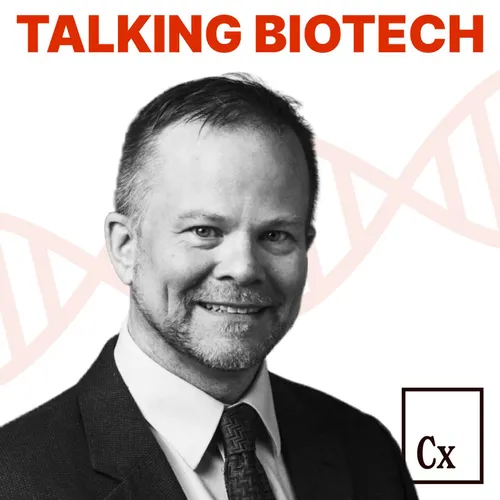
Talking Biotech with Dr. Kevin Folta
Talking Biotech is a weekly podcast that uncovers the stories, ideas and research of people at the frontier of biology and engineering.
Each episode explores how science and technology will transform agriculture, protect the environment, and feed 10 billion people by 2050.
Interviews are led by Dr. Kevin Folta, a professor of molecular biology and genomics.
- Update frequency
- every 6 days
- Average duration
- 42 minutes
- Episodes
- 468
- Years Active
- 2015 - 2025

Understanding Your Genetics with 23andMe - Dr. Joyce Tung
The more information you know about your genetics the better, right? This is the idea behind companies like 23andMe, which offer platforms to understand your potential genetic predisposition toward …

Biotechnology in the Crime Lab - Brian Hoey
DNA has been an invaluable tool to make certain matches between a suspect and a crime. Since its early use in the 1980s, we have seen an explosion in DNA sequence availability, allowing forensic scie…

The Shill Accusation and How to Respond - Dr. Chris MacDonald
If you've ever publicly communicated enthusiasm for a new product or technology, you inevitably have been accused to being a shill for the company that produced it. It is a normal part of human psych…

Sustainable Chemistry through Synthetic Biology - Dr. Chance Elliott, Amyris
Many consumer products contain chemistries that originate from an unsustainable source. Dr. Chance Elliott VP of R&D at Amyris describes how his company is using synthetic biology to engineer yeast t…

A Look at the Color of Future Medical Care - Dr. Alicia Zhou
The company Color has taken innovative approaches to varied aspects of public health. From at-home kits that can assess cancer risk, to efforts to curb COVID19, to finding attractive ways to make he…

Breaking Barriers in Protein Therapeutics - Dr. Dan Mandell
This is one hot tech discussion! Protein therapeutics have great potential, but significant limitations to their utility. Dr. Dan Mandell of GRO Biosciences explains how they are using a non-standar…

Innovations in High Throughput Proteomics - Dr. Parag Mallick
While many global genomics analyzes gene variants or RNA expression products, the levels of proteins are usually the most informative. At the same time, quantifying proteins is relatively difficult,…

The Amazing Potential of Cell Transplants - Brian Culley
Many diseases or disorders originate with a loss of cellular function. Cell death or damage is at the root of many problems associated with aging or injury. But what if the cells lost could simply b…

Adjusting to the Changing Biotech Landscape - Dr. Mike Tarselli
Dr. Mike Tarselli, CSO of Tetra Science and Kevin Folta have a conversation about careers in biotech, where the discipline is going, along with observations about what makes someone successful in the…

Drug Discovery in a Simulated Cell - Dr. Daniel Veres
What can be learned about biology from massive datasets, and can that information unveil opportunities for new therapeutics? This is the approach by Turbine. Today's podcast discusses Turbine's app…

COVID19 Misinformation "We Want Them Infected" - Dr. Jonathan Howard
The COVID19 pandemic was a challenge in public health, but became much worse through politicization of science and a thriving misinformation network. Over a short time, a cadre of personalities emerg…

Rebuttal to RFKj's Glyphosate Comments on Joe Rogan
Robert F. Kennedy Jr. is recognized for his bad science around critical issues like vaccination and agricultural chemistry. Recently he enjoyed a long-form, virtually uncontested platform on the Joe…

Happy Green Guacamole - The Non-Browning Avocado. Dr. Jeff Touchman
The avocado is a wonderful fruit that is gaining in popularity, full of healthful oils and other nutrients. However, consumers consistently note the obvious drawback of the short life of fresh avoca…

Talking Biotech Past, Present and Future
The 400th episode also represents the first episode of the 9th year-- an amazing run for a tiny, self-produced podcast. Where did it come from? In this episode I talk about the genesis of the Talki…

Next Generation Livestock Vaccines - Joel Harris
Vaccination is a cornerstone of animal health, and is critically important in animal agricultural operations. A number of devastating livestock diseases are prevented with vaccination, yet vaccines h…

Telling Science's Story - Sam Kean
Sam Kean is a prolific author that has a unique talent for sharing the stories of science. Trained in physics, Kean's work describes seminal events in science using a deeply researched narrative sty…

Constructing Brain Maps with Machine Learning - Dr. Stephan Doyen
The human brain is complex, but over the years massive data have been gathered regarding the relationship between structure and function. From functional MRI to many other techniques, researchers sl…

Novel Solutions for Chronic Kidney Disease -Dr. Andrew King
The kidney is one of the organs necessary to filter blood, composed of tiny functional units that separate waste products from molecules the body should retain. Chronic kidney disease is a significan…

Synthetic Circuits in Plant Biology - Dr. James Lloyd
Plant biologists use a set of tools to modulate gene expression. The well-established set of molecular switches are rather crude, with limited control of spatial or temporal expression. Dr. James Ll…

The Uphill Battle Against Scientific Disinformation - Dr. Lonni Besançon
Scientists are encouraged to step into the public conversation around controversial work, especially when that work seems to deliberately misinform, and can negatively affect public health. A series…